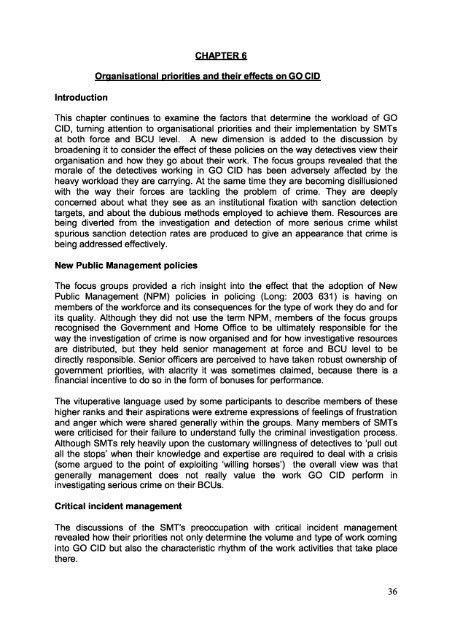LOSING THE DETECTIVES: VIEWS FROM THE ... - Police Federation
LOSING THE DETECTIVES: VIEWS FROM THE ... - Police Federation
LOSING THE DETECTIVES: VIEWS FROM THE ... - Police Federation
You also want an ePaper? Increase the reach of your titles
YUMPU automatically turns print PDFs into web optimized ePapers that Google loves.
Introduction<br />
CHAPTER 6<br />
Organisational priorities and their effects on GO CID<br />
This chapter continues to examine the factors that determine the workload of GO<br />
CID, turning attention to organisational priorities and their implementation by SMTs<br />
at both force and BCU level. A new dimension is added to the discussion by<br />
broadening it to consider the effect of these policies on the way detectives view their<br />
organisation and how they go about their work. The focus groups revealed that the<br />
morale of the detectives working in GO CID has been adversely affected by the<br />
heavy workload they are carrying. At the same time they are becoming disillusioned<br />
with the way their forces are tackling the problem of crime. They are deeply<br />
concerned about what they see as an institutional fixation with sanction detection<br />
targets, and about the dubious methods employed to achieve them. Resources are<br />
being diverted from the investigation and detection of more serious crime whilst<br />
spurious sanction detection rates are produced to give an appearance that crime is<br />
being addressed effectively.<br />
New Public Management policies<br />
The focus groups provided a rich insight into the effect that the adoption of New<br />
Public Management (NPM) policies in policing (Long: 2003 631) is having on<br />
members of the workforce and its consequences for the type of work they do and for<br />
its quality. Although they did not use the term NPM, members of the focus groups<br />
recognised the Government and Home Office to be ultimately responsible for the<br />
way the investigation of crime is now organised and for how investigative resources<br />
are distributed, but they held senior management at force and BCU level to be<br />
directly responsible. Senior officers are perceived to have taken robust ownership of<br />
government priorities, with alacrity it was sometimes claimed, because there is a<br />
financial incentive to do so in the form of bonuses for performance.<br />
The vituperative language used by some participants to describe members of these<br />
higher ranks and their aspirations were extreme expressions of feelings of frustration<br />
and anger which were shared generally within the groups. Many members of SMTs<br />
were criticised for their failure to understand fully the criminal investigation process.<br />
Although SMTs rely heavily upon the customary willingness of detectives to ‘pull out<br />
all the stops’ when their knowledge and expertise are required to deal with a crisis<br />
(some argued to the point of exploiting ‘willing horses’) the overall view was that<br />
generally management does not really value the work GO CID perform in<br />
investigating serious crime on their BCUs.<br />
Critical incident management<br />
The discussions of the SMT’s preoccupation with critical incident management<br />
revealed how their priorities not only determine the volume and type of work coming<br />
into GO CID but also the characteristic rhythm of the work activities that take place<br />
there.<br />
36
















